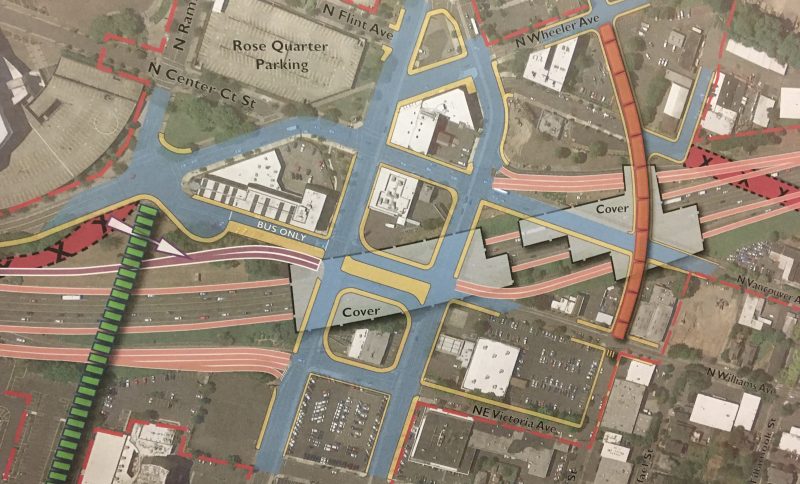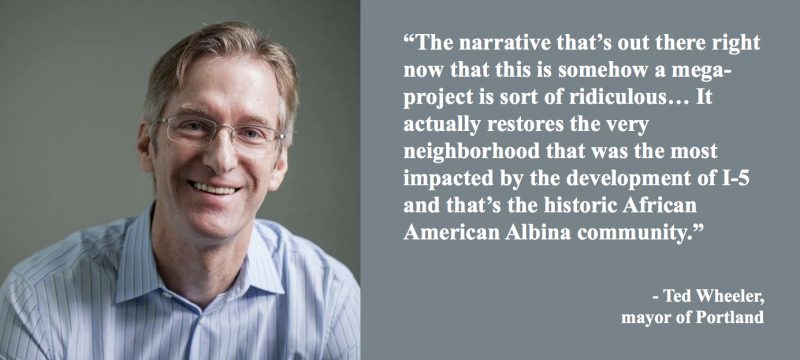Portland Mayor Ted Wheeler made his support for the I-5 Rose Quarter project very clear during a radio interview yesterday. He also pushed back rather strongly against the significant grassroots opposition to the project.
As a guest on Oregon Public Broadcasting’s Think Out Loud show, Wheeler answered several questions about the project from host Geoff Norcross. The interview came just a few hours before Wheeler would hear more testimony on the project at yesterday’s City Council public hearing on the Central City 2035 Plan. (Also notable at the hearing was that Wheeler invited seven people to testify in favor of the project, including Governor Kate Brown’s top transportation policy advisor Karmen Fore and State Representative Susan McClain.)
Here’s a recap of the short interview:
Norcross reminded Wheeler that one of the arguments against the project is that widening the freeway (plans call for a new travel lane and shoulder in each direction between I-84 and I-405) would simply induce more demand by “making it more attractive for people to drive”. “Are you concerned about that?” Norcross asked.
Wheeler’s response:
“I don’t dispute that significantly increasing traffic lanes does very little to arrest congestion. But I want to talk about what this project actually is. This has been a top priority for the governor, legislative leaders, the region and the city since at least 2012. So they’re all in. The narrative that’s out there right now that this is somehow a mega-project is sort of ridiculous. What we’re realy talking about here is a quarter of a mile, two auxiliary lanes through the Rose Quarter to make the merge safer. And about half of the funds being allocated are going towards bike, pedestrian, and transit improvements.
One of the parts of this that nobody talks about, that frankly is the most interesting to me, is capping I-5 and reconnecting the street grid for the historic Albina community. And that of course is mostly a bicycle and pedestrian play.
So I think this is being mischaracterized somewhat when people say, ‘Oh this is just a freeway expansion and it’s never going to meet its goals of congestion reduction.’ This is far from just focusing on just congestion reduction, this is an opportunity to restore one of our most historic — and not coincidentally — African American neighborhoods in this community. There’s a big opportunity here that goes to bikes, to peds, to transit and to community.”
The host then brought up Portland’s history of opposing freeway projects, namely the Mt. Hood Freeway. He also brought up how the I-5 project tore through north Portland neighborhoods when it was built.
Wheeler’s response:
“This is just the opposite of the Mt. Hood Freeway. This is one-quarter of a mile. It actually restores the very neighborhood that was the most impacted by the development of I-5 and that’s the historic African American Albina community. And that’s why people who have testified on this — who have testified overwhelmingly in favor of this — tend to be people from communities of color who understand that history.”
Advertisement

The host then brought up the question of congestion pricing.
“I’m 100 percent supportive of congestion pricing. I’m also supportive of the kind of transit improvements that this project could herald. If we are really serious about reducing congestion, the name of the game is getting people out of single-occupancy vehicles and encouraging active transportation or public transt as attractive alternatives. But to make them attractive alternatives you have to have the infrastructure in place that makes it work. This project does that and that’s why the governor, the legislature, Metro and the city council have strongly supported this proposal.”
“So you’re sure it will happen?” Norcross asked.
“This certainly doesn’t come to the Portland city council as a surprise. It has been in the works for many years. It has been well-vetted through many layers of government.”
“Were you surprised by the opposition?”
“No I wasn’t. Because the way the the opposition is characterizing the project simply as a freeway expansion is not the full story. If somebody came to me and said, ‘Hey Ted, do you want to spend half a billion on a freeway expansion?’ I’d say ‘No’ and ‘Hell no!’ But that’s not what this is. This is about reconnecting a community. It’s about bike, it’s about ped, it’s about transit, it’s about safety.”
Based on this interview and the fact that he invited seven people to testify in support of the project at the city council hearing yesterday, Mayor Wheeler has left no question where he stands on this project.
It’s worth noting a few things from his statements:
➤ He didn’t mention that the project will also add new shoulders (a.k.a. “breakdown lanes”) in both directions.
➤ Cost estimates for the various elements of this project are not yet known. Everyone is saying it’s 50/50 freeway/local streets but that’s an assumption.
➤ He says calling this a mega-project is “ridiculous”, yet at an estimated $450 million it’s $90 million more than the statutory definition of a mega-project as defined in Oregon law as per House Bill 2017, Section 121 (1) (on page 108).

➤ It’s unclear how two relatively small lids over the freeway will “reconnect the street grid for the historic Albina community”. ODOT has only described them as having vegetation and a former Portland Parks Bureau director said last week they’re likely to be “more of a liability than an amenity”. At City Council yesterday, one of Wheeler’s invited guests, Portland architect Matthew Arnold, testified that, “In my opinion those lids should be much larger if you really want to promote that kind of continuous urbanism.”
➤ He referred to the two freeway lids as, “mostly a bicycle and pedestrian play”. That use of the word “play” sounds like an ackowledgment that they were included in the project purely as a way to curry favor with active transportation advocates. Merriam Webster defines that use of the word as a “a move or series of moves calculated to arouse friendly feelings.”
➤ The mayor’s reference to people of color testifying “overwhelmingly in favor” of the project raises concerns. At the September 7th public hearing only four people (out of about 17 total) testified in favor of the project. Two of them were ODOT staffers (Shelli Romero and Andrew Plambeck), one was an invited Portland Planning Commissioner (Andre Baugh), and only one was an independent citizen (Terry Dublinski-Milton, who is white). Asked to clarify the mayor’s statement, his office said, “[At the September 7th hearing] handful of people of color testified and the majority of folks testified in support of the project which was in stark contrast to the people who testified in opposition. The evidence is in the recording of the council session.” (UPDATE: I’ve watched the hearing twice and stand by my assertions. It’s unclear to me how the mayor and his office can make a statement that doesn’t appear to mesh with the facts.)*
UPDATE, 3:30 pm on 9/18: The Mayor’s office has responded to my repeated requests for a clarification about this statement:
“The Mayor made a limited claim on Think Out Loud – based on his recollection of the hearing – that while there were not a lot of people testifying in favor of the plan during the first hearing, of those who did testify in favor, a majority were people of color. That’s all he said.”
➤ His claim that the project as been “well-vetted through many layers of government” is suspect. The freeway widening plan was one part of the larger N/NE Quadrant Plan and it has never been scrutinized by Portland City Council. That fact is the sole reason why Portland Planning Commissioner Chris Smith tried to get the commission to strip the project from the Transportation System Plan back in March (and he was just two votes shy of doing that).
In other I-5 Rose Quarter project news, three supporters of the No More Freeway Expansions group penned an editorial that was published on The Oregonian’s website last night: Portland leaders have a choice: increased congestion or courageous leadership.
— Jonathan Maus: (503) 706-8804, @jonathan_maus on Twitter and jonathan@bikeportland.org
Never miss a story. Sign-up for the daily BP Headlines email.
BikePortland needs your support.


